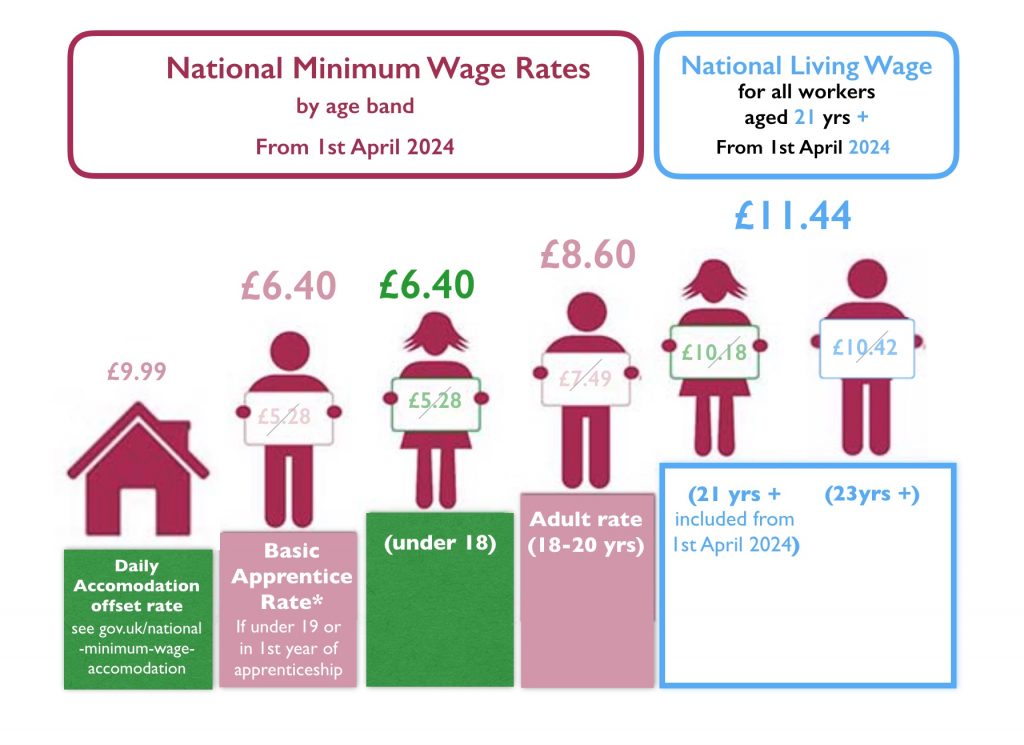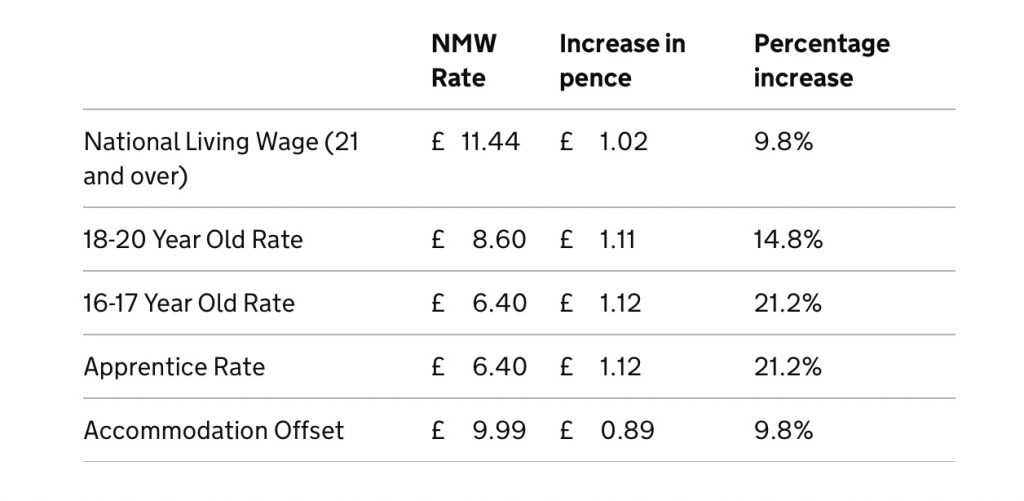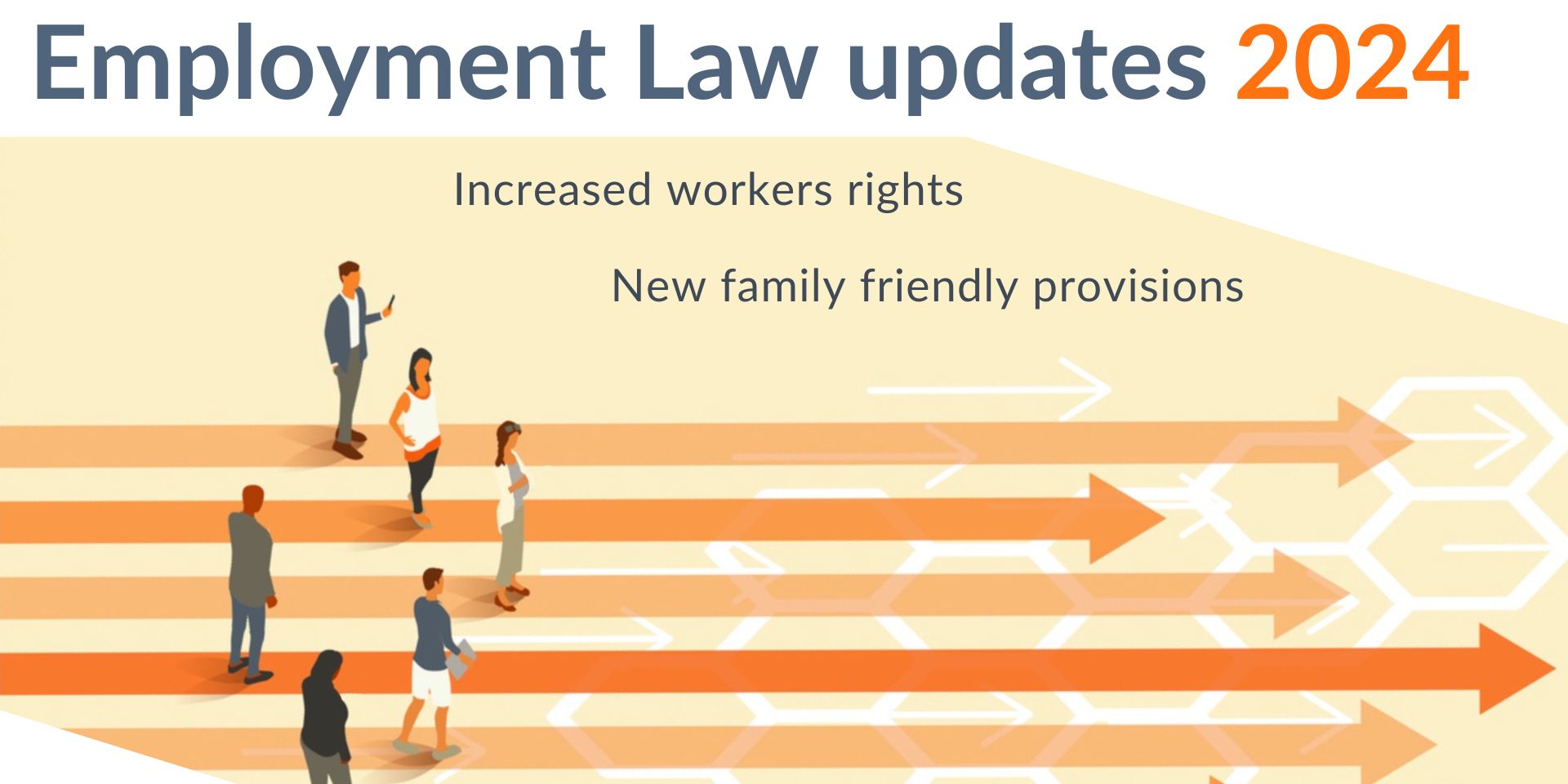Estimated reading time: 18 minutes
2024 is an exceptionally busy year for employment legislation. Most of the major new laws came into force in April this year. These employment law updates will bring you up to speed on the important new laws, their implications and the actions to take. The table of contents above lists the headline changes. The two main themes are increasing workers’ rights and provisions for working parents.
The Government has announced the annual increases to statutory payments and to employment tribunal awards from April 2024. Keep an essential reminder of these at your fingertips by downloading our concise one page Employment Law Factsheet, which includes helpful explainer notes, here:
Statutory payments of course include sick pay, maternity pay, NMW rate increases etc. from April 2024. Employment Tribunal award payments, known as compensation limits, cover scenarios such as redundancy payouts and awards for unfair dismissal.
Return of 12.07 % holiday pay for part-year & irregular hours workers
The Government has issued new guidance allowing employers to use the practical 12.07% “rolled up” method for calculating holiday pay for irregular hours and part year workers. The new guidance defines irregular hours and part year workers in this regard. Whilst these reforms (to the Working Time Regulations 1998) came into force on 1st January 2024, they apply to leave years that begin on or after 1 April 2024.
Rolled up holiday pay allows employers to include an additional amount with every payslip to cover a workers’ holiday pay, as opposed to paying holiday pay when a worker takes annual leave. The holiday pay is calculated at 12.07% of the total qualifying pay for that period. The new guidance states that from 1 January 2024, the qualifying pay must include commission payments, and any overtime payments which have been paid regularly to a worker in the 52 weeks preeceding the holiday pay calculation date.
Workers with regular hours and fixed pay are not allowed to be paid rolled up holiday pay. There is no change to how their statutory holiday entitlement is accrued. For regular hours workers, (and for irregular hours and part-year workers whose leave years begin before 1 April 2024) use the holiday entitlement calculator.
We explain rolled up holiday pay, with examples from the new guidance of how it is accrued and paid, and how to prepare for it in our guide to rolled up holiday pay in 2024. https://www.thelegalpartners.com/a-guide-to-rolled-up-holiday-pay-in-2024/
Actions to take
If you have flexible workers, check if they come under the new definitions, and update holiday policies to reflect the changes.
If you intend to start using rolled-up holiday pay for irregular and part time workers, check these workers’ employment contracts in case this amounts to a variation of contract. Get in touch if you are unsure.
Inform these workers of your intention to start using rolled-up holiday pay and ensure that this payment is clearly marked as a separate item on each payslip.
The new guidance does not mention agency workers whose periods of work are often irregular, so take care when deciding how to pay these workers holiday, and refer to the guidance.
Flexible working Act changes – Day One right to request from April 2024
On 6th April 2024, the Flexible Working (Amendment) Regulations 2023 came into force, giving employees the right to request flexible working from Day One, rather than after completing 6 months service.
The new law introduces the following additional changes to the process, which also take effect from 6th April 2024.
- employees will be able to make 2 flexible working requests a year, rather than just 1
- employers must respond to requests earlier, within 2 months rather than 3
- there are new requirements for employers to consult with the employee before turning down their flexible working request, (to curb the practice of blanket refusals with no discussions, though there is no minimum requirement setting out what the consultation should include) and
- Employees will no longer be required to lay out how the flexible working request might impact the employer.
Note that the 8 current statutory grounds on which an employer can reasonably refuse a request for flexible working remain.
Accompanying these legislative changes is a new draft Acas Statutory Code of Practice which is subject to Parliamentary approval. The aim of the Code is to provide employers, employees and representatives with a clear explanation of the law on the statutory right to request flexible working, alongside good practice advice on handling requests in a reasonable manner.
Actions to take
For full details on how to prepare for this, and the changes to the process, read our article “Employers guide to the Day 1 right to request flexible working” https://www.thelegalpartners.com/employers-guide-to-navigating-the-day-1-right-to-request-flexible-working/ .
Review your flexible working policies to ensure they are compliant. Aside from the Day One right to request flexible working the additional changes will put more of the onus on employers to find the flexible working solutions. It will mean dealing with successive requests, engaging more effectively and responding more quickly to requests and recording requests more assiduously.
Breaching the flexible working regulations can bring penalty awards of up to 8 weeks pay and potentially leave the business open to a costly discrimination claim. Remember by law you can only turn down a request using one of the 8 statutory reasons which are remaining in place, and if refusing a request be mindful of the discrimination risks. Make good use of trial periods for flexible working. Get in touch if you need advice.
Redundancy protection extended to returning mothers & new parents
A key new piece of employment legislation is The Protection from Redundancy (Pregnancy and Family Leave) Act 2023, which came into force on 6th April 2024.
For a long time the law has granted additional protection from redundancy to those on maternity, adoption or shared parental leave. They have the first right of refusal for any suitable alternative roles in a redundancy situation.
This new law extends the protection from redundancy for a further 6 months after maternity and adoption leave ends. The protection will also be extended to:
- Any employee who is pregnant, in a ‘protected period of pregnancy’ i.e has informed their employer,
- Any employee who informed her employer she is pregnant and has suffered a miscarriage within the previous 2 weeks, or
- anyone who has returned to work from maternity leave, adoption leave and shared parental leave.
The new Act doesn’t extend redundancy protection to fathers taking paternity leave. This is on the basis that the new provision is designed to ensure that employers don’t make any early judgment on performance in the first few months of someone returning to work after a long absence; which is not often the case in paternity leave.
Actions to take
If you have a redundancy policy which refers to redundancy protection, update it to reflect the extended protections.
When managing a redundancy situation from April 2024 onwards, make doubly sure to remember and prioritise those of your staff on maternity and other family related leave and those who have just returned. To manage this, mark the records of employees who have taken leave, noting their period of extended protection. With these extensions, the periods of protection will be up to 18 months from the expected week of childbirth. Which in effect means someone taking the full maternity leave (ordinary and additional) plus up to 6 months after they have returned.
Make sure to inform managers about the extension of this special status early on, so it can be incorporated into any redundancy planning. Do get in touch if you need advice on these very technical situations.
Increased flexibility in Paternity Leave
Following the birth or adoption of a child, an eligible father or partner can take one or two weeks’ paternity leave. Under the new Paternity Leave (Amendment) Regulations 2024, the rules have become more flexible, allowing the father or eligible partner to divide their two-week paternity leave into two separate one-week periods. Requiring only a month’s notice of their intention to take it, down from the previous 15 weeks before the expected week of childbirth.
The Regulations apply in all cases where the EWC is on or after 6 April 2024. Relevant policies will need amending to reflect these changes and managers should be made aware so that absences on paternity leave can be planned and effectively managed.
Leave for unpaid carers
The Government has introduced the Carer’s Leave Act 2023, which from 6 April 2024 will give employees with care obligations a minimum of one week’s unpaid carer’s leave per year. This unpaid leave will be available as a day one right as well as giving those who exercise the right protections from dismissal or detrimental treatment.
The extended rights to request flexible working, extended redundancy protections, new right to carers’ leave and increasingly flexible paternity leave are among a number of other family friendly provisions introduced by the Government this year, which are coming into force in 2024 and 2025. We cover these in full, with all the detail you need in our article employer’s guide to the new laws supporting working parents at https://www.thelegalpartners.com/new-laws-supporting-working-parents/ .
1 April 2024: New National Minimum Wage, National Living Wage rates
In the November 2023 Autumn Statement the Government announced the annual increases to the minimum wage and national living wage from 1 April 2024. They are:


In doing so, the Government accepted fully the recommendations of the Low Pay Commission (LPC).
Remember the National Living Wage has been extended to include 21 and 22 yr olds. Ensure you update the wages you are paying your employees, and pay special attention that any employees who move into the 21 yrs+ age bracket.
Apprentices are entitled to the National Minimum Wage for their age if they :
- are aged 19 or over AND
- have completed the first year of their apprenticeship.
So an apprentice aged 21 who in the first year of their apprenticeship is entitled to a Basic Apprentice Rate of £6.40 per hour from 1st April 2024. An apprentice aged 21 who has completed the first year of their apprenticeship is entitled to the National Living Wage of £11.44 from 1st April 2024.
Use the minimum wage calculator to double check that you are paying the appropriate wage rate. With the cost of living rising, it’s helpful to reference, but don’t confuse, the Living Wage Foundation’s published advisory rates for the real cost of living, found here.
6 April 2024: increases to annual tribunal limits and statutory redundancy payments
The 2024 increases to the employment tribunal compensation awards, and the maximum week’s pay for the purposes of calculating redundancy payments and basic tribunal awards are as follows:
- The maximum week’s pay for calculating statutory redundancy payment and unfair dismissal basic award increases to £700 (previously £643)
- So the maximum basic award for statutory redundancy payment and unfair dismissal awards increases to £21,000 (20 weeks pay subject to the limit on weekly pay above with a 1.5 multiplier if the employee is 41 or older)
- Maximum compensatory award for unfair dismissal (unlimited for certain automatically unfair dismissals such as health & safety or whistleblowing)
increases to £115,115 (previously £105,707).
Be mindful of these new amounts especially for dismissals taking place on or around 6 April. Double check all redundancy pay calculations on gov.uk’s redundancy pay calculator. Remembering of course that your staff employment contracts may make provision for enhanced redundancy payments and, in addition to any statutory or contractual redundancy payment, employees are also entitled to work their notice period or be paid for it instead of working their notice (known as Pay in lieu of notice or PILON).
Remember also that where an employee brings a successful case of unfair dismissal on the grounds of Discrimination, there can be levels of compensation awards for injury to feelings (with the ET assessed Vento bands depending upon severity) and in extreme cases these are not capped.
Increases to Vento guidelines
Vento bands for successful claims presented on or after 6 April 2024, the Vento bands are:
- a lower band of £1,200 to £11,700 (less serious cases)
- a middle band of £11,700 to £35,200 (cases that do not merit an award in the upper band)
- an upper band of £35,200 to £58,700 (most serious cases, with the most exceptional cases capable of exceeding £58,700).
Increases to statutory family related pay
On 6th April 2024 the rate for statutory sick pay increases to £116.75 per week (rising from £109.40).
Ensure all staff on maternity, paternity, adoption, shared parental leave and parental bereavement leave, as well as staff on sick leave, are paid the relevant statutory minimum rates.
7 April 2024: annual increases to statutory sick pay
On 7th April, the rate for statutory maternity, paternity, adoption, shared parental and parental bereavement pay will increase to £184.03 per week (up from £172.48).
Horizon scanning : further new laws and statutory codes of practice
Each of these legislative changes is scheduled to come into force in the coming months, but given the nature of their route through parliament (via private member’s bills in some cases) this isn’t certain. Keep these on your radar and if you haven’t already, subscribe to our Legal Updates e-newsletter below, and we will keep you up to speed on developments.
Tipping, gratuities, cover and service charges
The Employment (Allocation of Tips) Act 2023, will require that employers allocate all qualifying tips between workers with no deductions (other than those which are required by tax law). Employers will also be required to have a written policy explaining their allocation process. This ensures that tips are distributed in accordance with a new statutory Code of Practice on Tipping, which also makes an appearance in the Act. Employers will be expected to retain receipt and allocation records – and to share those records on request. The Act comes into force in May 2024, and its expected that the Government will publish a Code of Practice alongside it.
Workers (Predictable Terms and Conditions) Act 2023
On 18 September 2023, the Workers (Predictable Terms and Conditions) Bill received Royal Assent, becoming the Workers (Predictable Terms and Conditions) Act 2023 (Predictable Terms Act).
The Predictable Terms Act will amend the Employment Rights Act 1996 to give workers and agency workers the right to request a predictable work pattern.
This will apply where:
- there is a lack of predictability for a work pattern (fixed term contracts of 12 months or less are presumed to lack predictability).
- the change relates to their work pattern.
- their purpose in applying for the change is to get a more predictable work pattern.
A worker can apply twice in a 12-month period. The employer can reject an application on statutory grounds (for example: the burden of additional costs or the insufficiency of work during periods when the worker proposes to work). It is expected that there will a 26 weeks minimum service requirement to access this right. Workers can bring claims for procedural failings by the employer, unlawful detriment and automatic unfair dismissal. Regulations will provide further details of the statutory regime and are expected in September 2024.
The Predictable Terms Act and secondary legislation are expected to come into force by September 2024 so that employers have time to prepare.
Acas has produced a new code of practice to provide guidance on making and handling requests – see here.
New duty to prevent sexual harassment
The Worker Protection (Amendment of Equality Act 2010) Act 2023 comes into force on 26 October 2024.
The Act introduces a duty on employers to take reasonable steps to prevent employees from sexual harassment “in the course of their employment”. (This latter part of the Act reflects the commitments made by the Government in its response to the 2019 consultation on workplace sexual harassment).
The duty would be enforced by Employment Tribunals who would be allowed to apply an uplift of up to 25% to employees’ compensation in sexual harassment cases where the employer had failed to take reasonable steps to prevent this. The Equality and Human Rights Commission will produce an updated statutory code of practice to provide guidance to employers to help them understand the sort of steps they need to take to meet the new duty.
You will find all the detail on how to be fully prepared for this new duty in our previous article, New employer duty to prevent sexual harassment: prepare & protect your employees & your business, https://www.thelegalpartners.com/new-employer-duty-to-prevent-sexual-harassment/ .
In summary, employers should take reasonable steps to prevent workplace sexual harassment by:
- having a policy (usually in their Staff Handbook),
- providing training,
- taking steps to deal effectively with complaints, and
- where there is proven sexual harassment as a result of a grievance, taking appropriate disciplinary action against the employee(s) who perpetrated the sexual harassment.
Neonatal leave and pay
The Neonatal Care (Leave and Pay) Act 2023 will entitle parents to each take up to 12 weeks of paid leave, in addition to other leave entitlements such as maternity and paternity leave, to spend more time with their baby who, having been born prematurely or sick, is receiving intensive care. Neonatal leave will be a day one right and give parents protection from dismissal or detriment. The estimated time for the implementation is around 18 months following Royal Assent so this right is expected to be in force from September 2025. However, the Government is exploring ways to decrease this length of time while still allowing sufficient notice for employers and payroll providers to update their systems.
3 month cap on non-compete clauses
As part of its policy paper “smarter regulation to grow the economy” in May 2023, the Government announced plans to limit the length of non-compete clauses in employment contracts to three months. This 3 month cap on non-compete clauses represents a major shift that could see employers making greater use of garden leave clauses and imposing longer notice periods to protect the business’ interests.
Our article 3 month cap on non-compete clauses, brings you the complete picture on this provision and its implications for employers, https://www.thelegalpartners.com/3-month-cap-on-non-compete-clauses-implications-for-employers/ .
Trade Union and strike action
The Strikes (Minimum Service Level) Act became law on 20 July 2023 following months of parliamentary scrutiny. The Government is now implementing specific regulations for the passenger rail services, ambulance and fire and rescue services.
The approach to future Trade Union regulation area will be a key difference between the political parties in the forthcoming election.
ICO Helpful Guidance for Employers
The ICO produces very helpful guides for employers on a range of topics including data protection issues with employment situations including SARs. See here to access them.
Dismissal and re-engagement, fire and rehire
In the wake of the mass redundancies at P&O Ferries in March 2022, which occurred without notice or consultation, the Government announced that it would introduce a new Statutory Code of Practice on ‘fire and rehire’ practices. The draft Statutory Code of Practice is now published, and requires employers to hold “fair, transparent and meaningful consultations” with employees where changes are proposed for employment terms and conditions.
Acas advice on hybrid working
A reminder: in June 2022, Acas published updated advice to employers about hybrid working
For more information on the contractual changes employers need to make when switching to hybrid working, check our article on the employment law implications of hybrid working.
Government’s new suite of guidance clarifying employment status
The Government has published a new suite of online guidance to provide a ‘one-stop shop’ for businesses and individuals to understand which employment rights apply to them. There is a check list aimed at helping employers of all sizes to assess the employment status of people they engage to work for them and whether they are employees or workers or self employed. Our article here lays it out simply, and has a helpful one page check list on the main rights and protections afforded to all categories (as the Government’s check list ignores self employed contractors).
In other matters..
An important reminder on settlement negotiations with employees
Prompted by a recent case we’ve advised on, a quick but vital point to remember on Pre-Termination Negotiations, also known as ‘Protected Conversations’, and when you should use these to protect the business.
In a situation where there isn’t a dispute but you are looking to discuss with an employee bringing their employment with the Company to an end, for example if things are just not working out, then the normal “without prejudice” badging in communications with them won’t protect the business. Why? because there is no dispute at this point. (Without Prejudice is shorthand for saying “whilst I’m trying to reach a settlement with you because of a dispute, none of what I say can be used in a claim or an Employment Tribunal).
Instead you must use the phrase “pre-termination negotiations under Section 111A of the ERA 1996” in all settlement communications in order to protect the business.
As the ACAS code of practice on settlement agreements, emphasises below by using section 111A, the pre-termination discussions between an employee and employer are treated as confidential.
Section 111A of the ERA 1996 provides that offers to end the employment relationship on agreed terms (i.e. under a settlement agreement) can be made on a confidential basis which means that they cannot be used as evidence in an unfair dismissal claim to an employment tribunal.
Under section 111A, such pre-termination negotiations can be treated as confidential even where there is no current employment dispute or where one or more of the parties is unaware that there is an employment problem.
You can’t use the Section 111A protection in all situations; issues relating to whistleblowing, union membership, asserting a statutory right and discrimination are not covered by the confidentiality of section 111A. Do take advice on this if you are unsure.
In case you are wondering, Section 111 A can also be used in offers of a settlement agreement where there is a dispute, but in this scenario the ‘without prejudice’ principle applies also.
In a recent 2022 case of Mrs S Garrod v Riverstone Management Ltd the Employment Appeal Tribunal (EAT) dismissed Mrs Garrod’s appeal to allow references to the contents of a discussion between her and her employer which was labelled as “without prejudice” in her discrimination and harassment claim. This case went all the way to an EAT because the company hadn’t protected itself by using Section 111A in discussions. Take note.
This is already the most significant year of employment law updates that we have seen for a long time, bringing important changes for employers. With a general election due soon, 2024 and 2025 is going to be a critical period to keep abreast of changing employment legislation. We can help you get contracts, policies and practices ready, and we are of course here to guide you through it and keep you ahead of the curve. Do get in touch.






